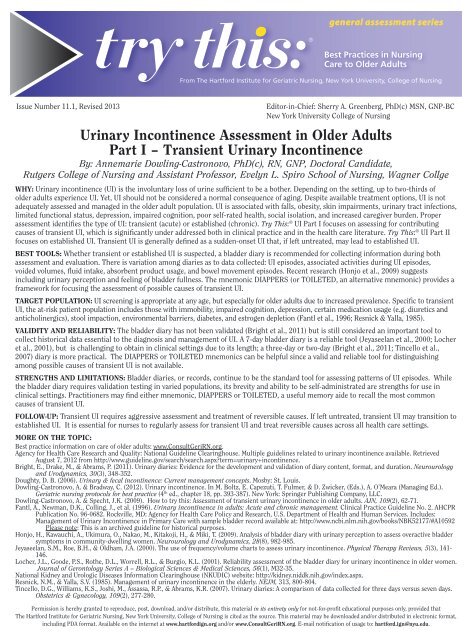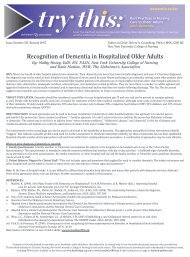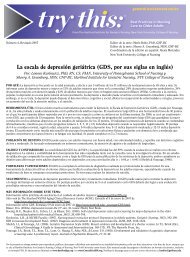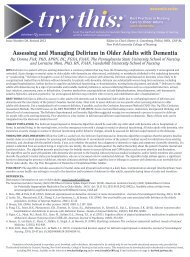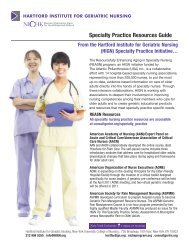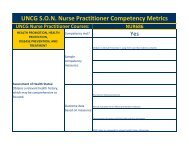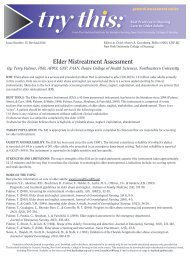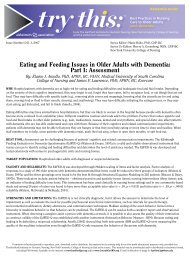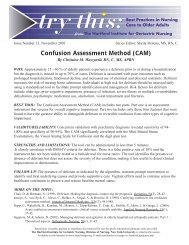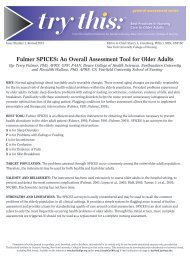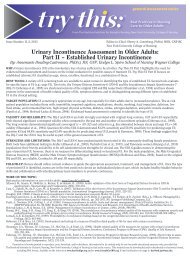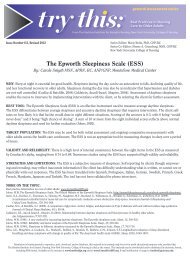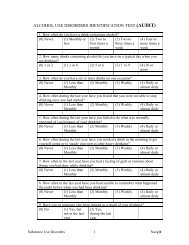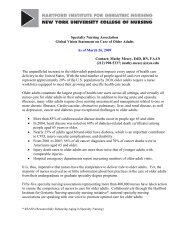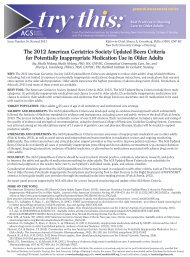Urinary Incontinence Assessment in Older Adults Part I â Transient ...
Urinary Incontinence Assessment in Older Adults Part I â Transient ...
Urinary Incontinence Assessment in Older Adults Part I â Transient ...
You also want an ePaper? Increase the reach of your titles
YUMPU automatically turns print PDFs into web optimized ePapers that Google loves.
<strong>Ur<strong>in</strong>ary</strong> <strong>Incont<strong>in</strong>ence</strong> <strong>Assessment</strong> <strong>in</strong> <strong>Older</strong> <strong>Adults</strong>BLADDER DIARY/RECORD - Track a 24-hour time period for several daysP.M. Hours A.M. HoursTimeInterval12:00–01:00 AM01:00–02:00 AM02:00–03:00 AM03:00–04:00 AM04:00–05:00 AM05:00–06:00 AM06:00–07:00 AM07:00–08:00 AM07:00–08:00 AM09:00–10:00 AM10:00–11:00 AM11:00–12:00 PM12:00–01:00 PM01:00–02:00 PM02:00–03:00 PM03:00–04:00 PM04:00–05:00 PM05:00–06:00 PM06:00–07:00 PM07:00–08:00 PM08:00–09:00 PM09:00–10:00 PM10:00–11:00 PM11:00–12:00 AMFeel<strong>in</strong>g aFull BladderVolumeUr<strong>in</strong>taed<strong>in</strong>ToiletIncont<strong>in</strong>entEpisode 1Reason forEpisode 2Type andAmountofLiquidIntake 3BowelMovement1Incont<strong>in</strong>ent episodes: (++) = SMALL: did not have to change pad/ cloth<strong>in</strong>g; (+++) = LARGE: needed to change pad/cloth<strong>in</strong>g2Examples of reasons for <strong>in</strong>cont<strong>in</strong>ent episodes: leaked while sneez<strong>in</strong>g; leaked while runn<strong>in</strong>g to the bathroom3Examples of type and amount of liquid <strong>in</strong>take: 12 oz can of cola, 2 cups regular coffee4Examples of product use: pad, undergarment; track times you changedProductUse 4Adapted from: Fantl, A., Newman, D.K., Coll<strong>in</strong>g, J., et al (1996). <strong>Ur<strong>in</strong>ary</strong> <strong>in</strong>cont<strong>in</strong>ence <strong>in</strong> adults: Acute and chronic management. Cl<strong>in</strong>ical Practice Guidel<strong>in</strong>eNo. 2. AHCPR Publication No. 96-0682. Rockville, MD: Agency for Health Care Policy and Research, U.S. Department of Health and Human Services.Adapted from: U.S. Department of Health and Human Services, National Kidney and Urologic Diseases Information Clear<strong>in</strong>ghouse (NKUDIC) Daily BladderDiary site (Updated 2010): http://kidney.niddk.nih.gov/kudiseases/pubs/diary/<strong>in</strong>dex.aspx.DIAPPERSPOSSIBLE CAUSES OF TRANSIENT URINARY INCONTINENCETOILETEDDeliriumInfection (e. g., ur<strong>in</strong>ary tract <strong>in</strong>fection)Atrophic urethritis or vag<strong>in</strong>itisPharmacology (e.g., diuretics, antichol<strong>in</strong>ergics, calciumchannel blockers, narcotics, sedatives, alcohol)Psychological disorders (especially depression)Endocr<strong>in</strong>e disorders (e.g., heart failure, uncontrolled diabetes)Restricted mobility (e.g., hip fracture population, environmentalbarriers, restra<strong>in</strong>ts)Stool ImpactionTh<strong>in</strong>, dry vag<strong>in</strong>al and urethral epithelium(Atrophic urethritis or vag<strong>in</strong>itis)Obstruction (Stool Impaction/Constipation)InfectionLimited mobility (Restricted mobility)Emotional (Psychological, Depression)Therapeutic medications (Pharmacological)Endocr<strong>in</strong>e disordersDelirium(Information <strong>in</strong> parenthesis refers to the DIAPPERS mnemonic)Source for DIAPPERS mnemonic: Resnick, N.M. & Yalla, S.V. (1985). Management of <strong>Ur<strong>in</strong>ary</strong> <strong>Incont<strong>in</strong>ence</strong> <strong>in</strong> the Elderly. NEJM, 313(800-804).Copyright 1985 Massachusetts Medical Society. All rights reserved. Adapted with permission.Annemarie Dowl<strong>in</strong>g-Castronovo, a Jonas Nurse Leaders Scholar (2010-2012), wishes to acknowledge that the development of this document was funded <strong>in</strong>part by the Jonas Center for Nurs<strong>in</strong>g Excellence.general assessment seriesBest Practices <strong>in</strong> Nurs<strong>in</strong>gCare to <strong>Older</strong> <strong>Adults</strong>A series provided by The Hartford Institute for Geriatric Nurs<strong>in</strong>g,New York University, College of Nurs<strong>in</strong>gEMAIL hartford.ign@nyu.edu HARTFORD INSTITUTE WEBSITE www.hartfordign.orgCLINICAL NURSING WEBSITE www.ConsultGeriRN.org


